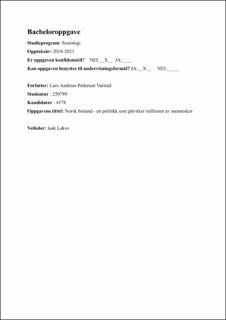| dc.contributor.advisor | Lekve, Isak | |
| dc.contributor.author | Valstad, Lars-Andreas Pedersen | |
| dc.date.accessioned | 2021-09-03T16:32:52Z | |
| dc.date.available | 2021-09-03T16:32:52Z | |
| dc.date.issued | 2021 | |
| dc.identifier | no.uis:inspera:80219422:36570725 | |
| dc.identifier.uri | https://hdl.handle.net/11250/2773419 | |
| dc.description.abstract | I denne kvalitative litteraturstudien har jeg analysert bistandspolitikken til partiprogrammene til Arbeiderpartiet, Fremskrittspartiet, Kristelig Folkeparti, Sosialistisk venstreparti og Miljøpartiet de Grønne. Dette for å se på hvordan de rettferdiggjør sin bistandspolitikk. Studiens teoretiske rammeverk knytter seg til Luc Boltanski og Laurent Thévenots teori om åtte verdiorden som handler om rettferdiggjøring. I gjennomgang av partienes bistandspolitikk ble det funnet at samtlige av de fem partiene har en relativt lik rettferdiggjøring av humanitære bistanden, hvor samtlige rettferdiggjør sin politikk med at de ønsker å støtte de som er påvirket av krig, konflikt og naturkatastrofer fortløpende. I politikken rundt klimabistand derimot er det stor uenighet i partienes rettferdiggjøring. Der noen partier ønsker en stor økning i klimabistand og har tro på at dette vil redusere klimaendringene og skape et bærekraftig samfunn, ønsker andre partier minimalt med klimabistand og argumenterer lite for dette i deres politikk. I rettferdiggjøringen om utviklingsbistand er det større uenigheter blant partiene. Her er det uenigheter om hvor mye partiene ønsker å støtte med, hvordan midlene skal delegeres og hvem bistanden skal støtte. Rettferdiggjøringen baserer seg på at samtlige ønsker å støtte land på en effektiv måte, der bistanden blir utnyttet slik at den har best funksjon. Her er fremgangsmåten veldig ulik blant partiene, da samtlige partier har ulik argumentasjon på hva og hvordan midlene skal brukes. | |
| dc.description.abstract | In this qualitative literature study, I have analyzed the aid policy of the party programs of the Labor Party, the Progress Party, the Christian People's Party, the Socialist Left Party and the Green Party. This is to look at how they justify their development aid policy. The study's theoretical framework is linked to Luc Boltanski and Laurent Thévenot's theory of eight orders of worth that deal with justification. A review of the parties' aid policies found that all of the five parties have a relatively equal justification for humanitarian aid, with all justifying their policies by wanting to support those affected by war, conflict and natural disasters on an ongoing basis. In the policy on climate aid, on the other hand, there is great disagreement in the parties' justification. Where some parties want a large increase in climate aid and believe that this will reduce climate change and create a sustainable society, other parties want minimal climate aid and argue little for this in their policies. In the justification for development aid, there are major disagreements among the parties. Here there are disagreements about how much the parties want to support, how the funds should be delegated and who the aid should support. The justification is based on the fact that everyone wants to support countries in an effective way, where development assistance is utilized so that it has the best function. Here, the procedure is very different among the parties, as all parties have different arguments about what and how the funds should be used. | |
| dc.language | nob | |
| dc.publisher | uis | |
| dc.title | Norsk bistand - en politikk som påvirker millioner av mennesker | |
| dc.type | Bachelor thesis | |
